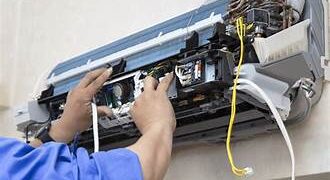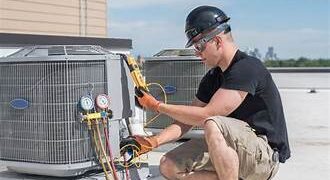Delving into the realm of air conditioner repair, this guide aims to provide valuable insights and practical tips on addressing common issues with your AC unit. Whether you're a DIY enthusiast or prefer professional help, this comprehensive overview will equip you with the knowledge needed to tackle any air conditioner problem effectively.
From identifying symptoms of a malfunctioning air conditioner to understanding the costs involved in repairs, this guide covers all aspects to ensure your cooling system stays in optimal condition.
Common Air Conditioner Problems
Air conditioners can encounter various issues that may require repair. It is important to be aware of these common problems to ensure your unit operates efficiently.
1. Refrigerant Leaks
Refrigerant leaks can cause your air conditioner to blow warm air or not cool properly. Look out for a noticeable decrease in cooling efficiency or hissing sounds coming from the unit.
2. Frozen Evaporator Coils
If your air conditioner is not cooling effectively, it could be due to frozen evaporator coils. This can be caused by restricted airflow or low refrigerant levels.
3. Electrical Issues
Electrical problems, such as faulty wiring or a malfunctioning capacitor, can lead to air conditioner failure. Symptoms may include the unit not turning on or frequent tripping of the circuit breaker.
4. Dirty Air Filters
Dirty air filters can restrict airflow and reduce the efficiency of your air conditioner. Regularly changing or cleaning the filters is crucial to prevent this issue.
5. Thermostat Problems
A malfunctioning thermostat can cause temperature inconsistencies or prevent the air conditioner from turning on at the desired settings. Ensure your thermostat is functioning correctly to avoid this issue.
Importance of Regular Maintenance
Regular maintenance is essential in preventing major air conditioner problems. By scheduling annual tune-ups and keeping up with filter replacements, you can prolong the lifespan of your unit and ensure optimal performance.
DIY Troubleshooting Tips
When your air conditioner starts acting up, it can be frustrating and inconvenient. However, before calling a professional, there are a few troubleshooting tips you can try at home to see if you can resolve the issue yourself. Here are some step-by-step guides and safety tips for handling minor AC repairs on your own.
Checking Air Filters
One common issue with air conditioners is clogged or dirty air filters. A dirty filter can restrict airflow and cause your AC to work harder, leading to inefficiency and potential damage. Here's how you can check and replace your air filters:
- Locate the air filter in your AC unit.
- Remove the filter and inspect it for dirt and debris.
- If the filter is dirty, replace it with a new one of the same size and type.
Inspecting Thermostat Settings
Incorrect thermostat settings can also cause your AC to malfunction. Make sure your thermostat is set to the right temperature and mode. Here's what you can do:
- Check the temperature setting on your thermostat.
- Ensure the thermostat is set to 'cool' mode and the desired temperature.
- If needed, change the batteries in your thermostat.
Cleaning Condenser Coils
Dirty condenser coils can reduce the efficiency of your AC system. Regular cleaning can help maintain optimal performance. Follow these steps to clean your condenser coils:
- Turn off the power to your AC unit.
- Locate the condenser coils and gently clean them using a soft brush or vacuum.
- Remove any debris or vegetation around the condenser unit to ensure proper airflow.
Knowing When to Call a Professional
While DIY troubleshooting can help with minor AC issues, there are times when it's best to leave the repairs to a professional. Here are some signs that indicate you should call an HVAC technician:
- If you hear strange noises coming from your AC unit.
- If your AC is leaking refrigerant
.
- If your AC is not cooling effectively despite troubleshooting efforts.
- If you notice any electrical issues or wiring problems.
Hiring a Professional Repair Service
When it comes to air conditioner repair, it is crucial to hire a professional technician to ensure the job is done correctly and efficiently. Here, we will discuss the different types of repair services available, the importance of choosing a licensed and experienced technician, and provide tips on finding a reliable repair service in your area.
Types of Repair Services
- Local Businesses: Local repair services are often well-known in the community and may offer personalized attention to customers.
- National Chains: National chains may have standardized procedures and training for their technicians, ensuring a certain level of quality.
- Independent Contractors: Independent contractors may offer more flexibility and competitive pricing, but it's essential to ensure they have the necessary qualifications.
Choosing a Licensed and Experienced Technician
- It is crucial to choose a technician who is licensed and certified to work on air conditioning systems to ensure they have the necessary skills and knowledge.
- Experience is key when it comes to air conditioner repair, as a technician with years of experience is more likely to diagnose and fix the issue accurately.
- Ask for references or check online reviews to gauge the reputation of the technician or repair service before hiring them.
Finding a Reliable Repair Service
- Ask for recommendations from friends, family, or neighbors who have recently had their air conditioners repaired.
- Check online directories or websites for local repair services and read reviews from previous customers to determine their reliability.
- Contact multiple repair services to compare prices, services offered, and availability before making a decision.
Costs Involved in Air Conditioner Repair
When it comes to air conditioner repair, costs can vary depending on several factors. Understanding the typical costs associated with AC repairs, factors that can influence these expenses, and tips for budgeting can help you plan for unexpected repair costs more effectively.
Breakdown of Typical Costs
- Labor Costs: The cost of labor for repairing an air conditioner can vary based on the complexity of the issue and the technician's hourly rate.
- Parts Replacement: The cost of replacement parts will depend on the specific components that need to be replaced and the brand of the air conditioner.
- Service Fees: Some repair companies may charge a flat service fee for diagnosing the problem, in addition to the cost of labor and parts.
Factors Influencing Repair Expenses
- Extent of Damage: The more extensive the damage to your air conditioner, the higher the repair costs are likely to be.
- Age of the Unit: Older air conditioning units may require more frequent repairs and replacement parts, increasing overall repair expenses.
- Brand and Model: Repair costs can vary depending on the brand and model of the air conditioner, as some models may have more expensive parts or require specialized repairs.
Tips for Budgeting and Planning
- Regular Maintenance: Schedule regular maintenance for your air conditioner to prevent costly repairs in the future.
- Emergency Fund: Set aside a portion of your budget for unexpected repair costs to avoid financial strain when repairs are needed.
- Compare Quotes: Obtain quotes from multiple repair companies to ensure you are getting a fair price for the necessary repairs.
Maintenance Tips to Prevent Future Repairs
Regular maintenance is key to keeping your air conditioner running smoothly and preventing costly repairs down the line. By following a seasonal maintenance checklist and performing basic tasks, you can extend the lifespan of your AC unit while ensuring optimal performance.
Seasonal Maintenance Checklist
- Clean or replace air filters every 1-3 months to improve airflow and efficiency.
- Inspect and clean the evaporator and condenser coils to prevent dirt buildup.
- Clear debris and obstructions from the outdoor unit to maintain proper airflow.
- Check refrigerant levels and recharge if necessary to prevent strain on the system.
- Inspect ductwork for leaks and seal any gaps to improve efficiency.
Benefits of Regular Maintenance
Regular maintenance not only helps prevent unexpected breakdowns but also extends the lifespan of your air conditioner. By keeping your AC unit in top condition, you can enjoy lower energy bills, improved indoor air quality, and a more comfortable home environment.
DIY Maintenance Tips
- Keep the area around the outdoor unit clear of debris and vegetation.
- Ensure the thermostat is set to the correct temperature and mode for optimal performance.
- Schedule professional tune-ups at least once a year to catch any potential issues early.
- Monitor the system for unusual noises, odors, or performance issues and address them promptly.
Closing Notes
In conclusion, maintaining your air conditioner through regular check-ups and timely repairs is crucial to its longevity and efficient performance. By following the guidelines Artikeld in this guide, you can troubleshoot issues effectively and keep your AC unit running smoothly for years to come.
Helpful Answers
What are some common signs of a faulty air conditioner?
Common signs include weak airflow, strange noises, unpleasant odors, and inconsistent cooling.
When should I consider hiring a professional for air conditioner repairs?
If you encounter complex issues like refrigerant leaks or electrical problems, it's best to seek professional help.
How can I find a reliable repair service for my air conditioner?
Look for licensed technicians, check online reviews, and ask for recommendations from friends and family.











